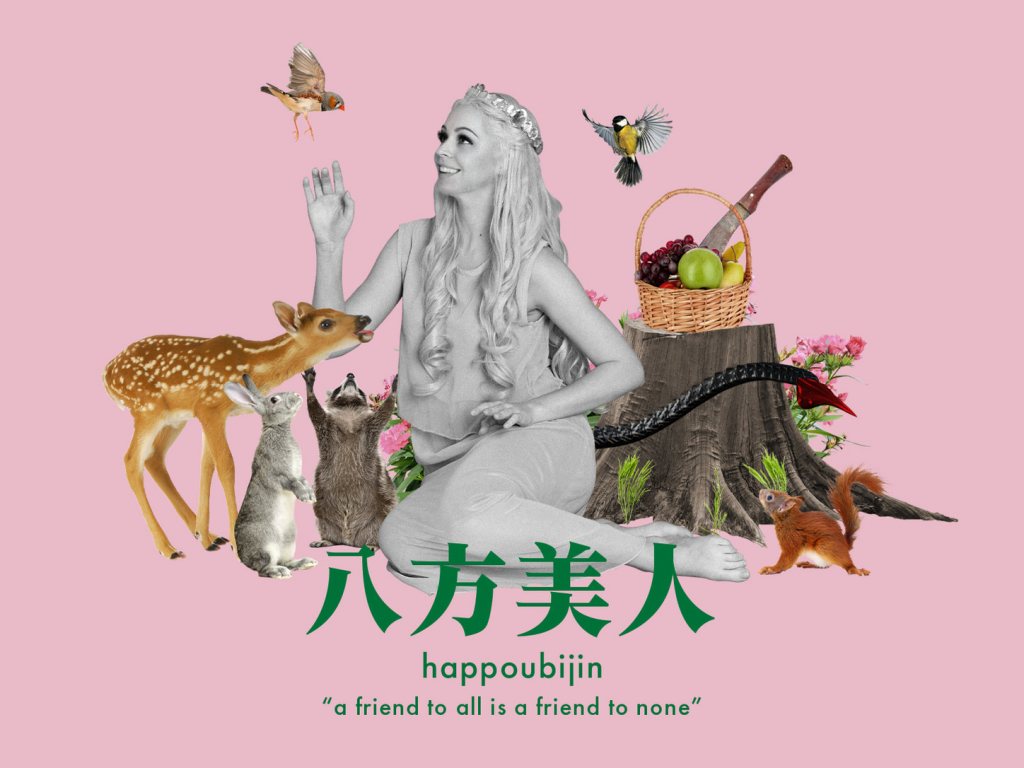We’ve all known that person who is impossibly lovely to everyone and their mother. And while many people are genuinely kind and appreciate everyone around them, others are often putting on a front — at least with some of the people they’re dealing with. Whether it’s to avoid ruffling feathers unnecessarily or for more sinister reasons, this person is known as a happoubijin in Japanese.
Happoubijin (八方美人)
Meaning: 1. Everybody’s friend, people pleaser, social butterfly, affable, putting on a front, putting on a facade, putting on a good face, a friend to all is a friend to none, two-faced (often implied but not said) 2. An extraordinary beauty, a flawless beauty
Literal translation and kanji breakdown: By breaking happoubijin into two words, we get “eight directions” and “beauty/beautiful woman.” Eight directions (八方) implies the person in question is always putting on a good face for those around them, but that may not necessarily be their true nature.
Happoubijin: The Origins
A close English expression would be “two-faced,” which suggests someone has a good side (that they show to most people) and a bad side (their true feelings, shared with others). But happoubijin has a whopping eight sides. Why so many? The eight faces represent all cardinal (N, E, S, W) and intercardinal (NE, SE, SW, NW) directions of the compass, so the person’s good image is impenetrable from any side.
Happoubijin is thought to be a relatively new expression, with one theory stating it was first recorded by Ogai Mori, in his 1912 novel Hatori Chihiro.
It’s worth mentioning that the original specification of the person being a bijin, a beautiful woman, was most likely intentional. The term was often used to portray women as deceitful opportunists when they were simply trying to keep their personal and professional relationships on an even keel. These days it can be used for all genders.
Happoubijin: Related Expressions
- 八面玲瓏 Hachimen-reirou Beautiful from all sides, perfect serenity
- 二股膏薬 Futamata-kouyaku Double dealer, someone who changes sides on a conflict
- いい顔ばかりする Ii kao bakari suru Always putting on a good face
- いい格好ばかりする Ii kakkou bakari suru Always putting on a front
Using “happoubijin” in a sentence
Happoubijin has a negative tinge, so it’s not used as a compliment.
- 彼は八方美人だから信用できない。Kare wa happoubijin dakara shinyou dekinai. He’s always putting on a front with everyone. I can’t trust him.
- 八方美人頼むに足らず Happoubijin tanomu ni tarazu. A friend to everyone is a friend to none.
- 彼女は八方美人で何を考えているかわからない。Kanojo wa happoubijin de nani wo kangaeteiru ka wakaranai. She is always putting on a good face so it’s impossible to know what she’s really thinking.
- 柳さんはいい人だと思ってたけど、知れば知るほどただの八方美人だ。Yanagi-san wa ii hito da to omotteta kedo, shireba shiru hodo tada no happoubijin da. I thought Yanagi was a good person, but the more I get to know him the more I realize he’s just a people pleaser.
Want more? Follow our weekly Yojijukugo Japanese Idiom series, published every Friday. Learn the meaning of “shikuhakku” here, “yudan taiteki” here and “taifu-ikka” here.
Gif via GIPHY









